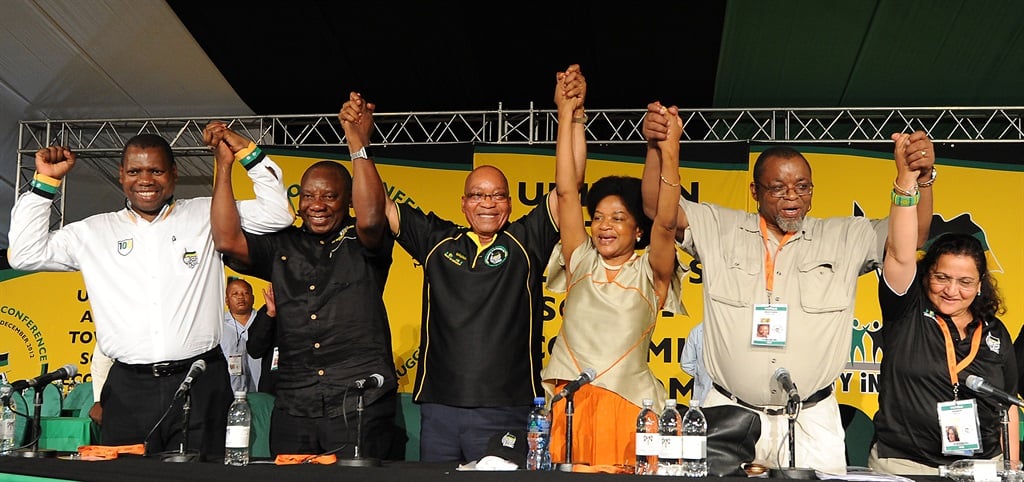
It is time to learn a lesson from ANC history.
The Mangaung elective conference in December 2012 marked the triumph for slates and state capture within the ANC, and the erosion of internal party democracy.
That was proved by the decision of the Constitutional Court immediately before the Mangaung conference, when it ruled there had been massive fraud of ANC branch decisions in Free State carried out by the ANC provincial executive committee headed by Zuma’s crony, premier Ace Magashule.
The great fraud perpetrated on the people of South Africa as a result of the country’s PR/party slate electoral system has its huge effect because ANC membership in the provinces is not proportional to the provincial populations.
The provinces with the highest ANC membership in 2012 were: KwaZulu-Natal with 331 000 members, Eastern Cape with 186 000 and Limpopo with 168 000.
While the KwaZulu-Natal membership of the ANC was 331 000, ANC membership in Gauteng was only 135 000.
This gave KwaZulu-Natal nearly two and a half times more influence than Gauteng in voting for the national executive committee at the Mangaung conference.
This is how the next government was decided in South Africa, in terms of our flawed electoral law. A party conference controlled the future of the country, not the voters, electing their own MPs in constituencies with equal numbers of voters across the whole country.
Once ANC secured its mandate in the general elections in April 2014, ANC MPs were appointed – not by the electorate – but by the much heavier influence of KwaZulu-Natal than Gauteng in the National Executive Committee elected by the delegates at Mangaung, and in the party slate of MPs drawn up in Luthuli House.
In terms of the electoral numbers, however, Gauteng had the highest population in the country (12.27 million, according to the 2011 census), followed by KwaZulu-Natal with 10.27m.
This means that through the party list electoral system, one ANC member in mainly rural KwaZulu-Natal had nearly three times more influence in terms of the appointment of ANC MPs in the National Assembly than one ANC member in urban Gauteng.
This was the result of an inbuilt system of discrimination against Gauteng voters, with a heavily overloaded weight in favour of KwaZulu-Natal in determining the number, identities and personal dependency of future ANC MPS and government ministers.
Gauteng, with 40% of the South African GDP, was the loser, with a vote lower than 10% in the ANC conference.
The resulting voice of discontent from Gauteng can be seen by the low vote for the ANC at the metro elections last year, with loss of Johannesburg and Pretoria/Tshwane.
With these electoral laws, rural population dictates to the urban population. This is not democracy.
A province with low population but high ANC membership has more leverage over the National Assembly and the government than the province with a high population but low ANC membership.
That is how undemocratic this electoral law is.
The rural vote of KwaZulu-Natal, North West, Free State and Mpumalanga can actually be used to dictate to the urban population of Gauteng and Western Cape. No wonder these populations are feeling short-changed by the ANC, and have resorted to voting for opposition parties.
Salvation for Gauteng ANC lies through electoral reform, with a new electoral law, so that MPs are elected by constituencies to establish the individual accountability of politicians downwards to the voters, not upwards to party headquarters. Members of Parliament will be coming from the constituencies rather than from slates.
The people of Gauteng can choose trustworthy ANC members as candidates for Parliament rather than having to accept being governed by appointees from Luthuli House.
The struggle for democracy did not end in 1994, and discrimination against the voice of the people did not end then either.
Just as in June 1976, when Gauteng roused the nation, it is time for Gauteng to raise the flag of democracy against a corrupt and unequal political system.
The party list system is a disgrace, and it must go. Responsibility rests on ANC members in Gauteng to come to the rescue of the nation at this time of crisis, by convening a provincial consultative conference where these issues can be fairly and democratically discussed.
There are times when it is dangerous, and a betrayal of future generations, to just sit on one’s hands and complain.
Gauteng must act now, in its own interest and that of the people of South Africa.
The People should govern, not a secret political cabal!
• Omry Makgoale is a rank and file member of the ANC. These are his personal views




 Publications
Publications
 Partners
Partners








